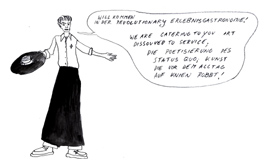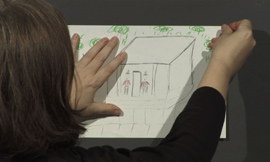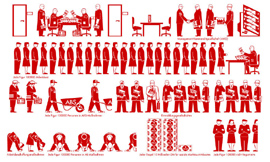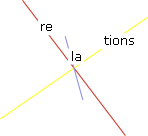|
|



FormatInternational group exhibitionExhibition, lectures, films, concerts
DateMay 28 until July 23, 2006Opening: May 27, 2006, 8 pm
LocationKunsthaus Dresden
CuratorsTorsten Birne, Sophie Goltz, Christiane Mennicke
Participating artistsLuchezar Boyadjiev, Pavel Brăila, DRESDENPostplatz, Fucking Good Art, Javor Gardev, Eva Hertzsch und Adam Page, Ute Hörner & Matthias Antlfinger, Inventory, Andrea Knobloch, Anne König & Jan Wenzel, Ivan Moudov, Observatorium, POP 8, Kiril Prashkov, Reinigungsgesellschaft, Christoph Schäfer, Kalin Serapionov, Antje Schiffers, Andreas Siekmann, spot_off, STAFETA - Svea Duwe/Dirk Lange/Grit Ruhland/Demian Tschistjakov, Krassimir Terziev, Ingo Vetter, Visual Seminar |
"Whoever knows only half, knows nothing:" this slogan could also be an apt description of the working process undertaken by the WILD CAPITAL / WILDES KAPITAL project, out of whose first phase – the gathering and exchange of information and impressions, followed by discussion at the symposium – the second phase now follows, the exhibition of artistic works. From the outset, the encounter between artists and theoreticians from Dresden and Sofia was structured to facilitate a steady convergence of different approaches, a passing through several phases within which opinions and preconceptions about capitalist processes of development were to be refuted, differentiated, and finally reformulated into new insights. How are concepts of the public sphere changing? How can the experience of a new economic system be made comprehensible through biographies? Which aspirations or longings are coalescing with the capitalist system and which experiences of disillusionment? Where do the different spatial concepts and the interests pursued by the actors clash? And can we really apprehend "space" as a real or imaginary border that capitalist praxis cannot transgress, as the Bulgarian cultural theorist Ivaylo Ditchev claims?
"In a way, space is one of the fundamental limits of capitalism: the intuition of space implies otherness; the underlying belief of capitalism is that anything can be replaced by another." Ditchev introduced this idea into the discussion at the Dresden symposium. Given the preceding initial encounter between the project’s participants from Dresden and Sofia and the frenzied system change which has thoroughly shaken living conditions in Sofia, it was not initially clear from a "western" perspective whether Ditchev was formulating an opinion or a hopeful expectation. After all, the choice of WILD CAPITAL / WILDES KAPITAL as a title stemmed from the observation that capital seemingly overcomes every conceivable limit and spurs on relentless "exchange:" from signs on facades to personal histories, from workplaces to clothing, from supply and demand. The regulated egalitarianism of state socialism was exchanged for the repressive individualizing of capitalism. In Ivaylo Ditchev’s view, what resists this attempt in the first instance – at least in Sofia – is something totally unexpected of post-socialist societies: privately-owned apartments. Private ownership – 90 per cent of all households – was the norm under the Communist regime in Bulgaria, and this was not only the case for the mixed districts built in the 1950s close to the center but also extended to the concrete high-rises built later along the city’s outskirts. To this day the sacrosanct private apartment for Sofia’s citizens forms a boundary, a final bastion against a besieging alien power determining their life-world and heralding social downgrading. But isn’t this boundary an illusion, a chimera? The works on show in the summer exhibition, the finale to the WILD CAPITAL / WILDES KAPITAL project, investigate these and other questions revolving around the relationship between space and capital. In the Kunsthaus Dresden, Eva Hertzsch and Adam Page (from Dresden) will stage a citizens’ assembly. A fictive live broadcast of the session behind closed doors shows video footage where city mayor Rossberg backs the sale of all of Dresden’s municipal apartments. The background: sixteen years after the fall of the Berlin wall, the Dresden city authority has managed to maneuver itself into a debt of such dimensions that only the privatization of 48,000 municipal apartments would appear to offer a way out. The bid by the American financial investor Fortress stands at around a billion euros – the end of the line for a city authority, its coffers now drained, which after 1990 had sought to set limits to the incursions of capital through its housing policies, through controlling the housing market, cleverly devised planning and models, and byelaws regulating space usage and advertising. The works of other artists also address the expansionist impulse of capital, which goes so far as to even impede the promises of happiness it generates. In the laconic object of an elevator booth, Ivan Moudov (Sofia) has identified a fitting metaphor for the experience of shifting circumstances, reflecting advancement up the social ladder and the yearning for freedom. The hitch is that upon pressing the button the only thing that elevates is the floor.... Along the same vein, Krassimir Terziev’s artwork merges the separate routes of spending and earning money, which pave their way through the city. He stages a collision between two buses, one with working migrants from eastern Europe, the other with western European tourists. The wreckage is accompanied by excerpts from a performance at the Semper Opera and a monitor displaying job ads. Andreas Siekmann (Berlin) investigates in his "theatrum oeconomicus" the role played by a company known as Treuhand in the privatization of the East German economy. In pictograms, charts, diagrams, and texts, but also a figurine merry-go-round, the rise and fall of Treuhand is staged as an example of corrupted political structures and the degradation of human labor to a mere statistical item. In contrast, the Dresden artist group Reinigungsgesellschaft experienced the privatization of the textile industry by a Serbian "Treuhand," delayed by the civil war, as a tentative success story. Javor Gardev (Sofia) is to play the role of Major J. Stefanow, a leading figure in the newly formed "Sofia Taste Police." Stefanow/Gardev will be interviewed by six of Bulgaria’s most popular television presenters. Through the authority exuded by the medium of television, this fiction turns into reality and aesthetic taste into a generally accepted law. Against the backdrop of Dresden’s development into an "imaginary city," and similar to how the sociologist Karl-Siegbert Rehberg has analyzed the pictographic arrangement of the Baroque in the city, the exhibition WILD CAPITAL / WILDES KAPITAL depicts how both the influence of capital as well as the imagined limits of capitalism are leading to a revaluation of social relations in post-Socialism.
|
